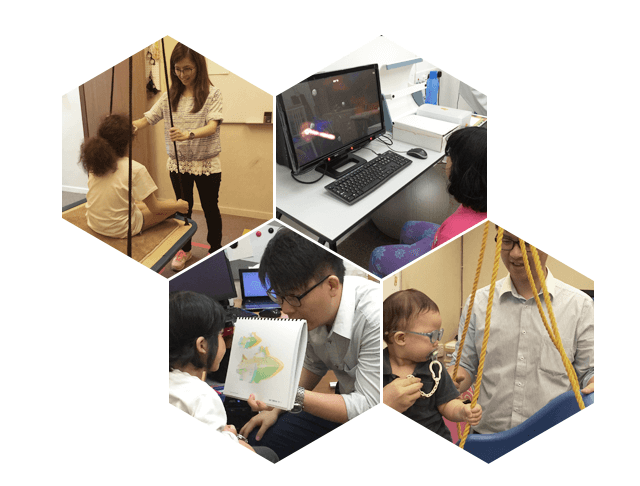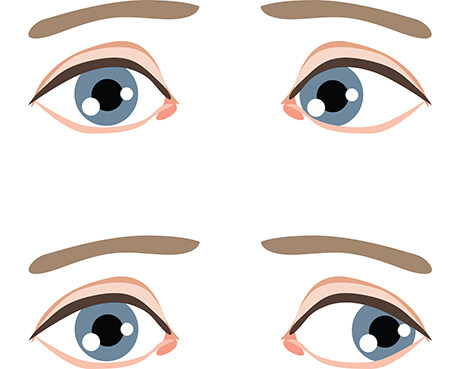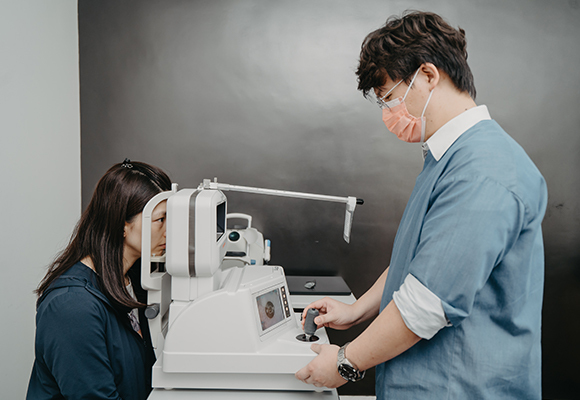What causes lazy eye?
Lazy eyes are mostly resulted by abnormal changes to the nerve pathways between the eye and the brain.
Secondly they can be caused by imbalanced eye muscles prevent them from working together. A significant difference of prescriptions between two eyes could also cause the changes to the eye muscles.
Finally, deprivation amblyopia. Eg: cataract can prevent the clear vision in that eye.

Lazy eyes can happen to both adults and children. We have seen lazy eyes in adults caused by accidents such as car accidents, stroke and concussions.
While in most cases lazy eyes in children happened due to the vision in the eyes do not develop in the way it should.
Celebrities with lazy eyes
(i) Melissa Joan Hart
(ii) Paris Hilton
(iii) Ryan Gosling
(iv) Heidi Klum
(v) Kate Moss
There are a few types of treatments for lazy eyes
(i) Using an eye patch
The “good” eye is covered up with a special patch for a few hours a day for several months, so the “lazy” eye is forced to work.
Advantage:
Simple and cost-effective treatment
Disadvantage:
Time-consuming due to the brain is accustomed to using a better eye when the patch is removed from the weaker eye, the brain will revert back to use the better eye.
Unpleasant experience, making the vision worse by taking the good eye away from the patient.
(ii) Eye drops
Atropine eye drops can be used to temporarily make it difficult for the “good” eye to see properly. This drug dilates the pupil and numbs the muscles of the good eye making the lens unable to focus for a few hours, so the weaker eye is forced to work.
Advantage: Does not require constant vigilance from parents or patients
Disadvantage:
Can cause eye irritation, redness of the eyes and headaches
(iii) Vision Therapy
Teach patients to use both eyes together correctly which gets rid of the lazy eye.
Advantage:
Effective, non-surgical treatment
Disadvantage:
Regular practice of eye exercises
Good cooperation between therapist and patient

Eye patching is recommended with a vision therapy program, placing the eye patch on the good eye. It can force the lazy eye to work and develop a better connection to the brain.
The doctor will tell patients how long they should keep the eye patch on, depends on their severity and type of lazy eye. Doctor probably suggest that patients wear the eye patch 2 to 6 hours a day.
Surgery is used to improve a squint by strengthening or weakening the eye muscles of the lazy eye to change its position. This means the lazy eye will appear to be aligned with the good eye. However, lazy eye cannot be corrected by surgery, but their eyes will look straighter and it will help both eyes work better together. More than one surgery may be needed to improve the appearance of a squint, and glasses may still need to be worn after surgery.
The children will wear a special glass when playing the game to affect how the game looks to each eye. Usually, reduced contrast can be seen by better eyes while the high contrast can be seen by the weaker eyes. Both eyes can see the background in high contrast. Research showed that the children in the iPad group played the game for an hour a day, five days a week, for two weeks. The children were able to read an average of 1.5 more line on a letter chart as compared to the before treatment. Those in the eye patch group wore an eye patch for 2 hours a day, seven days a week, and for two weeks. They could read 0.7 more lines on the letter chart as compared to the before treatment.
However, it's still not clear whether the vision improvements in the children after they played the game will last over the long term, the researchers said, so future research is needed to justify this question.
Yes. Lazy eyes can be inherited from family history. Hence, it is better to check with an eye doctor from a child’s birth until they are adults to ensure the brain and eyes can form the connections. These connections can be delayed when the vision in one or both eyes are blocked. As the result, the vision from one eye being dimmer than another eye. Eventually, the brain learns to ignore the dim image and the eye is getting lazy.
Yes, in some cases, it is possible to have both lazy eyes.
This is because they have a less detailed 3D version of the world. Hence, they might have an easier time translating what they see onto the 2D page – whether it was for a painting of a diner scene, sketch for mobile, or plan for a building.
People who have focusing trouble and difficulty see 3D movies and art. About 3% of people with misaligned eyes can be diagnosed by looking at photographs of a person. Line drawing is a backdoor to the brain to learn how the brain makes sense of the visual world.


